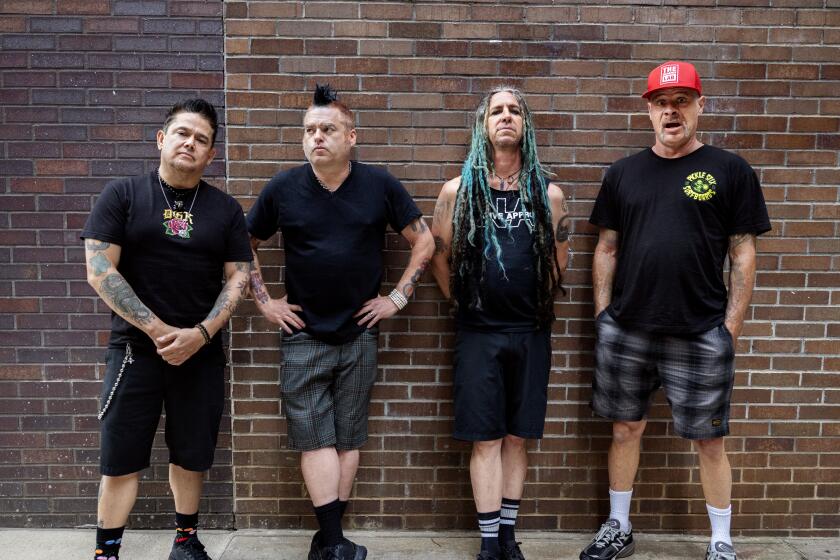A voice will rise
Concert promotion -- the business of hiring an act, booking a venue, selling the tickets and counting the money -- is one of the music businessâ most lucrative enterprises. Itâs also one of its most faceless. How many fans at Princeâs recent Staples Center show knew, or cared, that it was a Concerts West production? Or that Clear Channel is the promoter of Madonnaâs upcoming Forum dates?
But in two notable cases over the years, promoters have become true tastemakers whose musical passion resonates beyond the cubicles of booking agencies and out into the ears of music fans.
The archetype was Bill Graham Presents, rooted in San Francisco and flower power. Then thereâs Goldenvoice, which sprang from L.A.âs punk rock world in the early 1980s to exert a profound influence on the live music scene, ushering the leading punk, grunge and alternative rock acts to the cityâs stages. The standing of bands it has nurtured is indisputable, from No Doubt and Janeâs Addiction to Nirvana, the Red Hot Chili Peppers and Rage Against the Machine.
In the process, it became a culture fixture in Los Angeles, but with its Coachella Valley Music and Arts Festival, Goldenvoiceâs legacy has now spread far beyond Southern California.
Music fans -- some 50,000 of them each day of the two-day event -- will make the pilgrimage to Indio this weekend from all across the U.S. and overseas. This fifth edition of the festival gathers nearly 100 top-grade artists at every level of popularity, from stadium-fillers such as Radiohead and the Cure to niche club bands and cult DJs. Coachella is easily the premier large-scale event on todayâs U.S. rock landscape.
And it comes courtesy of a company thatâs been hit by three major jolts over the years: the federal drug bust of its founder, a potentially mortal financial loss on the first Coachella, and most recently a death in the family.
âThat was the worst news I ever got in my life, about Rick,â Goldenvoice president Paul Tollett says. Heâs talking about Rick Van Santen, his co-worker for nearly 20 years and the co-owner of the company since 1992, who died early this year at age 41 from complications of the flu.
âItâs been what, six weeks?â Tollett, 38, continues, sitting in his Miracle Mile office at AEG Live, the company that purchased Goldenvoice in 2001. âAfterward thereâs been some great news too, some of the bands weâve confirmed for Coachella. But the good news is not as good as the bad news was bad.... .Thereâs been highs but there definitely have been lows, and the lows have been as low as you get.â
Thatâs Goldenvoice in a nutshell, more an emotional thrill ride than a standard business. It began in 1981 as an I-think-I-can upstart, stepping into a void left by mainstream promoters scared of punk and unaware of the vital rock scene bubbling beneath the Top 40 surface.
Goldenvoice had a field day bringing bands out of their do-it-yourself circuit into established venues with professional sound and production. The company also had a nose for the best of L.A.âs thriving scene. Tollett recalls a 1987 Goldenvoice concert at Fenderâs in Long Beach, where the opening act stole the show from the other nine bands. The group was called No Doubt.
Talent agent Marc Geiger, who represented such acts as the Smiths, Echo & the Bunnymen and New Order with his partner Don Muller, remembers how Goldenvoice dominated the underground music scene.
âGoldenvoice bought everything and, more important, they were also the nice guys,â says Geiger, who later co-founded the Lollapalooza tour. âTheyâd be the guys who would be backstage handing out joints and letting extra people on the guest list and not being uptight, in a town where not being uptight gets you far.â
From a cramped office at the Hollywood Palladium, and later from houses in Hollywood, Goldenvoice took on the big boys in the concert business. The tiny staff included musicians Pat Smear (formerly of the Germs, later with Nirvana and the Foo Fighters) and Paul Cutler (45 Grave).
âIt was an awesome place, a creative place,â says Moss Jacobs, a partner from 1994 until 2001. âWe didnât have staff meetings, we just yelled across the rooms.... The controlled chaos of the operation enhanced its ability to move fast, act fast, act crazy and act creatively.â
How fast? âI remember one Christmas morning,â says Tollett. âThere was a benefit that needed to be put together, and by 5 oâclock in the afternoon Rick had seven bands confirmed, on Christmas day.â
That style had been set by Goldenvoiceâs founder, Gary Tovar, who started out doing shows in Santa Barbara before moving into the Los Angeles fray. In 1985 he hired Tollett, a chemical engineering student at Cal Poly Pomona who was producing small ska and mod shows on the side, to run the daily operations. For marketing he tapped Van Santen, a punk enthusiast and aspiring promoter from L.A.âs Westside.
Tovar was also doing some business -- the illegal kind -- in Arizona. He was arrested in 1991 and wound up serving 5 1/2 years of a seven-year sentence in federal prison.
The arrest shook Tollett. Heâd quit school to devote himself to Goldenvoice, and now his shaky ship had sprung a big leak. But he and Van Santen decided to buy the indebted company in 1991.
The timing couldnât have been better. Alternative music suddenly became a commercial powerhouse, and Van Santenâs years of networking began to pay dividends.
Jay Marciano, now Tollettâs boss at AEG, was a rival when he headed Universal Concerts in the 1990s. He saw the Goldenvoice magic at work. âWhen a bandâs at the 800-seat El Rey,â he says, âand the guys are hanging out with them at 3 in the morning, theyâre going to enjoy a special relationship that the Universal Amphitheatre might not be able to have until years later.â
Things were hopping in the â90s as Goldenvoiceâs core audience swelled to arena size. The company secured rights to the Hollywood Palladium, and Van Santen spearheaded expansion into Hawaii and Alaska.
He was âa booking machine,â in the words of one colleague, and a prankster who loved to interact with musicians. Tollett, in contrast, was what one associate refers to as âa curator,â a consummate nice guy with impeccable taste -- but also tough at the negotiating table.
But despite the alt-rock boom, Goldenvoice couldnât outflank the relentless consolidation of the concert industry in the late â90s. Its giant rivals locked up exclusive rights to key venues. Goldenvoice was suddenly on the outside looking in at such longtime strongholds as the Palace (converted to the Avalon) and the Wiltern, both now tied to Clear Channel.
What to do?
Tollett had fond memories of staging Lollapalooza tour stops in the wide open spaces of Cal State Dominguez Hills and Hansen Dam Recreation Area.
âIt taught us the whole fence-generator-toilet side of life, and it seemed really exciting,â he says. âIt just hit us like, âOK, that may be our direction, âcause weâre never gonna own an amphitheater, weâre never gonna own an arena. Thereâs a million fields, letâs go find some and come up with ideas that are fresh.â â
Coachella was fresh, a festival based on the European model that would present a connoisseurâs view of the most creative rock going. But the very week the inaugural event went on sale in 1999, the Woodstock reunion turned into a fiasco. Rock festivals looked like hell on earth. Despite the presence of Beck, Rage Against the Machine and Tool, total attendance for the two-day Coachella event was a disappointing 40,000. The hit to Goldenvoice was in the neighborhood of $800,000.
âIt was so hard financially,â Tollett says. âBut the next day, driving around, knowing about what we lost, I was just thinking, âThat was the greatest two days Iâve ever had. Itâs horrible that itâs putting us out of business.â â
Coachella ultimately cost Goldenvoice its independence, but not for a while. And it didnât put it out of business.
âWe were struggling financially, and when people smell blood they usually attack,â Tollett says. But the sharks stayed at bay. Some rival promoters, perhaps hoping to form an alliance, lent Goldenvoice money. Geiger and Muller, the talent agents, even got their clients Beck and Rage Against the Machine to reduce their Coachella fees by some $200,000.
âThere was a strategic reason; it wasnât just emotional,â Geiger says. âYouâve got to be protective of those people. They played a very important role.â
Tollett and Van Santen had regularly considered merging with another company, and things finally seemed right when AEG Liveâs Concerts West division came calling. The company, a national touring operation, set up Goldenvoice as its L.A. counterpart and allowed the firm to keep its name and longtime staff. And itâs managed to keep its personality as well.
With AEGâs deeper pockets, the Coachella festival got a second chance -- a one-day affair headlined by Janeâs Addiction in April 2001. It broke even. Back to two days in 2002, with Bjork and Oasis, Coachella was on its way.
AEG Live now has Tollett involved in New Orleansâ annual Voodoo Fest and formulating plans to stage festivals in other U.S. locations in the next couple of years. The company also will expand into conventional concert production in other cities.
But even with the triumph of this fifth, nearly-sold-out Coachella on the horizon, Tollett is subdued on this late afternoon in his office, still grappling with the emotion stirred by Van Santenâs death.
âItâs hard to get congratulations and then condolences,â he says softly.
At Goldenvoice, itâs something you learn to live with.
More to Read
The biggest entertainment stories
Get our big stories about Hollywood, film, television, music, arts, culture and more right in your inbox as soon as they publish.
You may occasionally receive promotional content from the Los Angeles Times.










